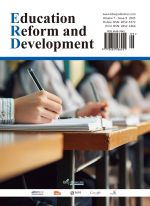Abstract
Artificial Intelligence (AI) offers innovative solutions to address the teaching challenges of linear algebra courses caused by their high level of abstraction, such as students’ difficulties in comprehension, lack of interest, and weak self-directed learning abilities. This study proposes empowering educators to reconstruct teaching models through three key strategies: building intelligent teaching platforms (enabling personalized resource recommendations, learning path planning, and real-time feedback), leveraging data-driven instructional decisions (to dynamically optimize teaching content), and deploying intelligent tutoring systems (with virtual assistants to explain abstract concepts). Meanwhile, to tackle challenges such as data privacy, teachers’ adaptability to technology, and integration of educational resources, it is necessary to enhance data security mechanisms, strengthen teacher training, and promote inter-institutional collaboration. Future development will move toward multimodal interaction (e.g., VR/AR to enhance visual intuition) and interdisciplinary integration, advancing AI from a supporting tool to a core driving force of educational innovation, ultimately serving the goal of cultivating high-quality, versatile talents.
References
Wang J, Wang C, Teng J, et al., 2025, Issues, Solutions, and Problem-Solving in Building a Strong Education Nation. China Educational Technology, 2025(4): 1–12.
Xie H, Zhou X, Hou C, 2025, Challenges, Opportunities, and Pathways: Research on Journalism and Communication Education under the Background of AIGC. Integrated Media, 2025(4): 23–31.
Ju H, Fang Y, Liu Z, et al., 2025, Path Analysis of the Impact of Technology on Education: From “Educational Informatization” to “Educational Digital Transformation”—A Conceptual Distinction Perspective. China Educational Technology, 2025(4): 48–56.
Zhou L, 2025, Exploration of the Application of “Artificial Intelligence + Ideological Education” in Mathematics Courses. Talent and Wisdom, 2025(9): 33–36.
Zhang Q, 2025, On the Research Framework for the Digital Transformation of Higher Education: A Literature Review and Prospects Based on Basic Connotations, Influencing Factors, and Implementation Effects. Higher Education Development and Evaluation, 41(2): 34–46 + 130.
Dong Y, Liu H, Ren Y, et al., 2025, Application of Contextualized Teaching Model in Ideological Education of Linear Algebra Courses. Journal of Huzhou University, 47(2): 99–104.
Kan Y, 2024, Research on Several Problem-Solving Methods in “Linear Algebra”. Journal of Liaoning University of Technology (Social Sciences Edition), 26(6): 121–125.
Yang X, 2024, Case-Based Flipped Classroom to Support the Practical Teaching Reform of Linear Algebra. Science Consultation, 2024(22): 70–74.
Lu T, 2025, Research on the Cultivation of Information Literacy in Higher Vocational Colleges under the Background of “Internet + Education”. Science Education and Culture, 2025(3): 83–87.
Zou L, Zhang L, 2024, Challenges and Countermeasures of Generative Artificial Intelligence in the Application of Smart Classrooms. Computer Knowledge and Technology, 20(28): 177–180.
Bu H, 2025, What Has Digitalization Brought to Schools: A Case Study Based on Shanghai’s Educational Informationization Benchmark Training Schools. China Educational Technology, 2025(4): 32–39.
Wen J, 2024, Practical Research on Teaching and Learning Mode Transformation Under the Concept of Autonomous Learning. Jilin Education, 2024(18): 14–15 + 35.
Wei F, Yang K, Zhu Z, 2025, Collaborative Inquiry and Intelligent Creation: A New Learning Model in the Era of Generative Artificial Intelligence. Open Education Research, 31(2): 14–23.
Hu X, Liu X, Chen L, et al., 2025, Integration of Artificial Intelligence into Basic Education: Does It Help Alleviate Overcompetition or Promote New Qualities? Open Education Research, 31(2): 45–54.
Zhu Y, Zhang J, Han X, 2025, A New Form of Personalized Learning Based on Generative Artificial Intelligence. E-education Research, 2025(4): 58–64.
